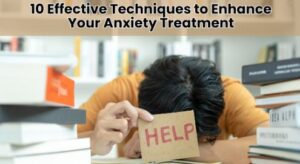10 Effective Techniques to Enhance Your Anxiety Treatment

Anxiety can feel overwhelming, sometimes making life seem unbearable. While therapy and medication are the prescribed treatments, many wonder if there are more ways to enhance their effectiveness for long-term relief.
Could additional strategies complement these methods and provide deeper comfort? You can empower yourself to manage anxiety better by incorporating practical, holistic techniques to improve overall well-being.
Practice Mindfulness Practice
Mindfulness is the best tool to help you control anxiety. It makes you live in the moment so that one does not think too much about what has been and what is going to happen. Meditation, deep breathing exercises, and mindful observation can help quiet your mind and keep you centered.
Incorporating mindfulness into daily life is straightforward. For example, sitting quietly for five minutes each morning may be used to observe one’s breath or surroundings without judgment. In cases where anxiety is more persistent, many people find that turning to anxiety centers can provide valuable resources and professional strategies for managing symptoms. Over time, these practices will rewire your brain to stay centered, making it easier to navigate anxious thoughts and feelings.
Build a Consistent Routine
A structured daily routine can eliminate the unpredictability that often triggers anxiety. A daily routine builds a sense of control: over your time, as well as over your use of energy.
Start by establishing a regular rhythm of waking, eating, and sleeping. Make time for exercise, hobbies, and relaxation. A predictable day reduces mental strain, giving you more bandwidth to focus on treatment. A balance of being productive and self-care would promote resilience and build your anxiety management plan foundation.
Discover Cognitive Behavioral Strategies
One of the most recognized and evidence-based methods of therapy for anxiety is Cognitive Behavioral Therapy or CBT. You can apply CBT techniques in daily life, even outside therapy sessions.
CBT helps you be aware of and counter the negative thinking that triggers anxiety. For instance, if you tend to expect the worst, CBT can help reframe such thoughts into more balanced perspectives. Regular practice strengthens your mental resilience, helping you handle situations more confidently.
Exercise More
Physical exercise profoundly impacts mental health. This exercise stimulates the production of endorphins, generally referred to as “feel-good” hormones that positively elevate your mood and help alleviate stress.
You do not have to take extreme exercise to benefit from these activities. For instance, doing yoga, brisk walking, or swimming can help you in the same way. Exercise is also a great healthy release of pent-up energy and nervousness, which leaves you feeling grounded and more in control. Incorporating exercise into your routine strengthens both your body and mind, complementing other anxiety treatments.
Eat a Balanced Diet

What you eat can significantly impact how you feel. A balanced diet that includes nutrient-dense foods supports your brain’s ability to regulate mood and stress levels.
Incorporate foods rich in vitamins, minerals, and healthy fats like leafy greens, lean proteins, nuts, and whole grains into your diet. Omega-3 fatty acids, including those found in fish and flaxseed, are even more beneficial to mental well-being. Do your best to limit or avoid foods that contain too much sugar and caffeine, because these elements can increase anxiety symptoms caused by increased heart rate and jitteriness.
A healthy diet will not only look after the body but will also allow therapeutic and medical interventions to work, making it a foundation of mental health.
Adopt Relieving Techniques
Relieving techniques are one of the primary tools used in managing anxiety. Progressive muscle relaxation, guided imagery, and aromatherapy are techniques that will assist the patient to relax and interfere with the response of the body towards stress.
For instance, progressive muscle relaxation is tensing and then gradually relaxing each of your body muscles. This technique not only reduces physical tension but also trains the mind to recognize and release signals of stress. Similarly, guided imagery allows you to create vivid images of calming situations, such as walking along a beach, which could distract and soothe your mind.
Regularly incorporating these techniques into your routine creates a reservoir of coping tools, ensuring you’re better prepared to handle stressful situations.
Strengthen Social Connections
Strong social connections can be a vital buffer against anxiety. Sharing your feelings with trusted friends, family members, or support groups can provide emotional relief and reduce feelings of isolation.
Humans are essentially social, and meaningful connections foster feelings of belonging and security. Whether it’s a daily phone call, becoming part of a local group, or attending community events, making an effort to connect can have a really big effect on your mental health. Building and maintaining these relationships ensures you will have someone to rely on during times of stress.
Limit Your Exposure to Stressors
Another way to improve treatment is by reducing unnecessary stressors in your life. Stressors that heighten anxiety and then learning how to minimize or eliminate them will create a more relaxed and supportive environment.
For example, if you are finding social media increases your stress levels, then you may cut down the time you spend on screens or avoid screens at specific intervals. If work stress becomes too high, then one can try to seek boundaries and distribute the tasks in healthier ways. An ideal home setting without mess and distraction would help with relaxation and clarity of thought.
By actively managing your stressors, you allow your treatment efforts to work more effectively, which will help regain control over your mental health.
Practice Self-Compassion
This is yet another crucial, though easy-to-forget aspect of anxiety management. Anxiety will make you highly critical of yourself regarding failure or shortcomings in different areas of your life.
Try instead to treat yourself with the same understanding and kindness you would extend to a close friend. After all, it’s the journey and not the destination; therefore, it’s acceptable to have setbacks. Appreciate yourself for however little you have managed so far because growth is slow.
Self-compassion not only fosters a good relationship with yourself but also reduces the pressure and guilt that may intensify the symptoms of anxiety.
Incorporate Professional Guidance
Regardless of how many self-help techniques you practice, professional guidance is the final foundation for proper anxiety management. Professionals such as therapists, counselors, or psychiatrists are well-equipped and trained to help you with various evidence-based approaches that work specifically for you.
Therapy creates a safe space for the clients to explore their feelings and look at patterns that lead to their anxiety. In some cases, medication prescribed by your healthcare provider can be beneficial in your treatment plan. By regularly meeting with your provider, your plan will update you, making the most of its effectiveness in time.
Confidence for the Next Steps
Improvement in the treatment of anxiety can be seen as multi-dimensional, including personal effort with professional assistance. These strategies can help an individual create a better environment for healing.
Conclusion
Remember, this is a process of building confidence that takes time. With each step of mindfulness, exercise, or any other kind of socialization, you move closer and closer to a life rich in peace and resilience. Properly strategized ways of getting through anxiety problems help people walk through difficult steps and regain their full potential with confidence.
FAQs
- How can mindfulness practice help with anxiety management?
Mindfulness helps you focus on the present moment, reducing the tendency to overthink past or future events. Regular mindfulness practices, like meditation and deep breathing, calm the mind and reduce anxiety by rewiring the brain to stay centered.
- Why is exercise important for reducing anxiety?
Exercise triggers the release of endorphins, which are “feel-good” hormones that improve mood and relieve stress. Activities like walking, yoga, or swimming can help manage anxiety by releasing pent-up energy and promoting mental well-being.
- How can self-compassion support anxiety treatment?
Self-compassion involves treating yourself with kindness and understanding, especially when facing setbacks. It reduces self-criticism and helps to manage anxiety by fostering a positive relationship with yourself, lowering pressure and guilt.
Information contained on this page is provided by an independent third-party content provider. XPRMedia and this Site make no warranties or representations in connection therewith. If you are affiliated with this page and would like it removed please contact [email protected]

